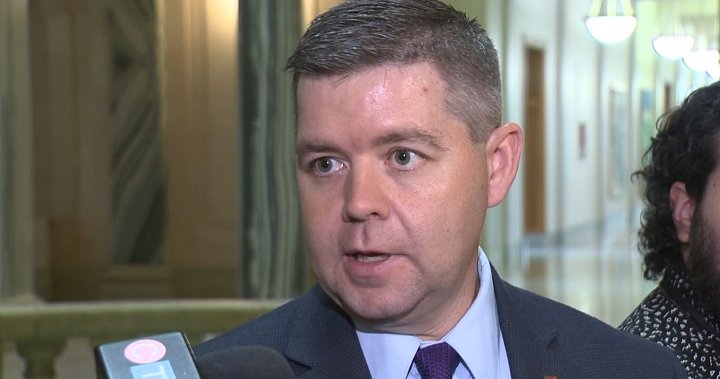Saskatchewan‘s immigration and career training minister, Jeremy Harrison, said the federal government should provide a path for Ukrainian refugees coming to the province to remain here permanently.
On Thursday, the federal government announced it was expanding its program that helps Ukrainian refugees coming to Canada, extending the time refugees can stay from two years to three years. The government also broadened the eligibility for family members of Ukrainian nationals, even if they don’t have Ukrainian citizenship.
Read more:
Saskatchewan prepared to accept large number of Ukrainian refugees
Federal immigration minister Sean Fraser said the program could potentially welcome millions of people.
In an interview on Focus Saskatchewan, Harrison said he told Fraser anyone coming to the province from Ukraine fleeing the violence of the Russian invasion should be allowed to remain.
“If there is a desire to stay in Saskatchewan and in Canada, in a more broad context,” he said, “there would be a path to which those refugees would be able to secure permanent residency and ultimately citizenship.”
Harrison also repeated his statement that the province is prepared to welcome an “unlimited” number of refugees from Ukraine, though he said the actual number will depend on the federal government.
Asked why the provincial government was ready to bring in an unlimited number of Ukrainian refugees when it had only welcomed about 1,000 Syrian refugees and a few hundred Afghan refugees, Harrison pointed to the province’s Ukrainian connection.
“Literally 15 per cent of this province’s population descended either whole or in part from Ukraine. There are still many communities in this province where Ukrainian is spoken on a daily basis.”
Harrison says this is the “unique difference” compared to what you may see from refugees from other countries.
Read more:
Canada will allow Ukrainians fleeing Russia’s war to stay for 3 years
“You have such a large Ukrainian expatriate community. You have such a long tradition of Ukrainian history, settlement and institutions, both social and otherwise, that exist already in the province.
“That really makes us uniquely positioned to be able to accommodate and resettle in a positive way, a very large number (of refugees),” Harrison said.
“That probably wouldn’t have been the case for those who were coming from other parts of the world who may have had those unique circumstances existing in other parts of Canada in a much more profound way than exist for Ukrainians who could be resettled here in this province.”
Harrison said that regardless of what country they are fleeing from, the federal government decides where to allocate refugees through the government-assisted refugee stream.
“That is really not something that is up to the provinces, that is up to the government of Canada,” he said.
“They make those determinations based on a number of factors … but primarily about where the resettlement outcomes are to be likely to be the most successful.”
© 2022 Global News, a division of Corus Entertainment Inc.
For all the latest World News Click Here
For the latest news and updates, follow us on Google News.

